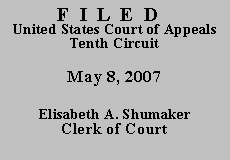

| UNITED STATES OF AMERICA,
Plaintiff-Appellee, v. JEROME VICTOR TRAFNY, Defendant-Appellant. |
(D.C. No. 2:04-CR-91-TC)
|
The defendant appeals the district court's denial of his post-judgment motion in which he sought relief from his criminal sentence under Fed. R. Crim. P. 36 (providing that the district court may correct a clerical error at any time). We vacate the order for lack of jurisdiction, construe the defendant's notice of appeal and appellate brief as an implied application for authorization to file another 28 U.S.C. § 2255 motion, and deny authorization.
The defendant was convicted, following a guilty plea, of one count of bank robbery, for which he was sentenced to 151 months' incarceration to be followed by 36 months of supervised release. He was also ordered to pay $6,083.00 in restitution. On direct appeal, pursuant to a joint stipulation entered into by the parties, the matter was remanded for resentencing under United States v. Booker, 543 U.S. 220 (2005). See United States v. Trafny, No. 04-4160 (10th Cir. Feb. 28, 2005) (unpublished order). On remand, the court lowered the incarceration period to 63 months, but did not change the period of supervised release or the amount of restitution.
Pursuant to a subsequently filed 28 U.S.C. § 2255 in early 2006, the district court again filed an amended judgment, this time changing when the restitution payments were to begin and when drug testing of the defendant while he was on supervised release would be done.
Later the same year, the defendant again sought relief under § 2255, claiming that the imposition of supervised release voided his sentence under Booker and violated the Double Jeopardy Clause. The district court transferred the motion to this court as a successive § 2255 motion. Authorization to file the motion was denied. See Trafny v. United States, No. 06-4229 (10th Cir. Dec. 15, 2006) (unpublished).
The defendant then filed the Rule 36 motion which is the subject of this appeal. He argued that the district court did not impose supervised release at the sentencing hearing and that therefore the written judgment which did include supervised release needed to be corrected to delete the period of supervised release.
The district court denied the motion, concluding that the defendant's motion was really a § 2255 motion and that the judgment which the defendant sought to challenge was already the subject of the previously filed § 2255 motions. See United States v. Nelson, 465 F.3d 1145, 1147, 1149 (10th Cir. 2006) (a pleading asserting a new ground for relief is advancing a new claim and is therefore treated as a successive § 2255 motion under Gonzalez v. Crosby, 545 U.S. 524 (2005), no matter what the pleading is entitled). The district court, however, lacked jurisdiction to deny the motion. See Nelson, 465 F.3d at 1148 ("[A] second or successive § 2255 motion cannot be filed in district court without approval by a panel of this court. As a result, if the prisoner's pleading must be treated as a second or successive § 2255 motion, the district court does not even have jurisdiction to deny the relief sought in the pleading.") (internal citations omitted). Accordingly, the court's order must be vacated. Id. at 1146.
We will, however, treat the defendant's notice of appeal and appellate brief as an implied application for leave to file another § 2255 motion. Id. at 1149. See also United States v. Torres, 282 F.3d 1241, 1246 (10th Cir. 2002) (the court is not required to give notice to a petitioner before recharacterizing a pleading as a § 2255 motion where the pleading is a second/successive motion; "to allow a petitioner to avoid the bar against successive § 2255 motions by simply styling a petition under a different name would severely erode the procedural restraints imposed under [§] 2255.").
After thoroughly reviewing the matter, we conclude that the defendant has failed to make the prima facie showing required by § 2255 as amended by the Antiterrorism and Effective Death Penalty Act. His contentions are not based on newly discovered evidence that, "if proven and viewed in light of the evidence as a whole, would be sufficient to establish by clear and convincing evidence that no reasonable fact finder would have found [him] guilty of the offense" or on a "new rule of constitutional law, made retroactive to cases on collateral review by the Supreme Court, that was previously unavailable." 28 U.S.C. § 2255. In fact, the defendant challenged the imposition of supervised release in one of his previous § 2255 motions.
The district court order is VACATED, and the implied application for
authorization to file another § 2255 motion is DENIED. The mandate shall issue forthwith.
ENTERED FOR THE COURT
PER CURIAM
*. This order and judgment is not binding precedent, except under the doctrines of law of the case, res judicata, and collateral estoppel. The court generally disfavors the citation of orders and judgments; nevertheless, an order and judgment may be cited under the terms and conditions of 10th Cir. R. 36.3.